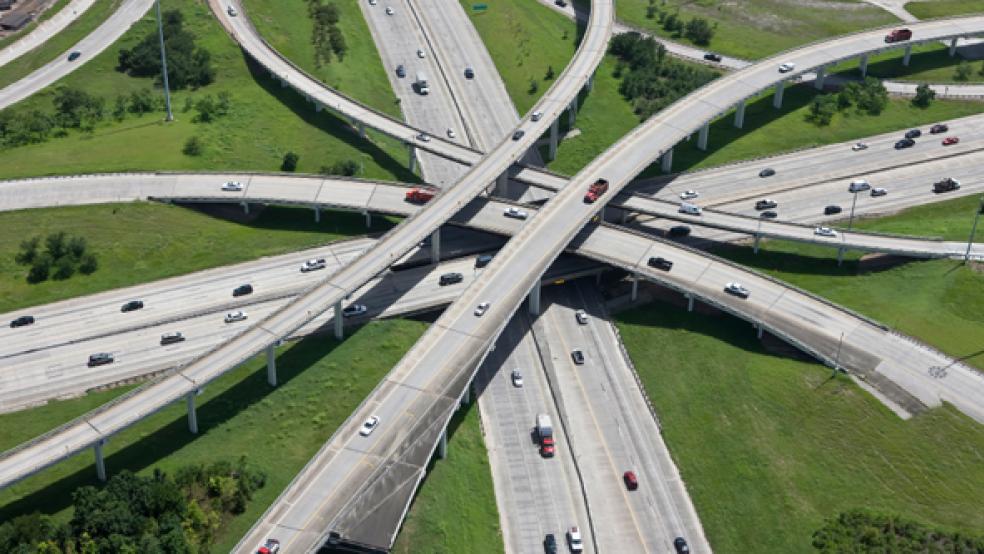A real budget crisis is festering that could make the fiscal cliff seem like a molehill. It will paralyze the nation’s bridge, highway and mass transit construction this summer and potentially set back many state economies. Yet, it has received scant attention from Congress, at least until now.
Related: GOP Approves Ryan Budget As Dems Quietly Cheer
The federal highway trust fund that finances more than $50 billion annually in highway and bridge construction is running out of cash and will be bankrupt by late July or early August, at the height of the construction season, according to Department of Transportation (DOT) projections.
Coming off one of the worst winters in memory, some state and local governments have already begun pulling back on plans for filling potholes and paving highways. Things could get much worse if Congress and the Obama administration allow a four-year transportation funding authorization law to expire this fall without a replacement.
“It is critical for our nation to continue investing in our aging infrastructure,” Boxer said. “Preserving the Highway Trust Fund needs to be our number-one priority. … We must work together to find the sweet spot for a dependable, bipartisan source of funding.”
The big question, as always, is how to generate the extra money. There are rival ideas, including one being touted by President Obama and the DOT to use corporate tax reform to generate the additional funds.
The Highway Trust Fund covers nearly two thirds of all government highway transportation spending and is the lifeblood of tens of thousands of construction companies and suppliers and nearly 600,000 workers, according to industry estimates. Unless Congress finds a way to avert the bankruptcy of the fund, President Obama warned earlier this year in St. Paul, Minn., “We could see construction projects stop in their tracks, machines sitting idle, workers off the job.”
Senate Budget Committee Chair Patty Murray (D-WA) warned on the Senate floor earlier this week of a shutdown of road repairs and new infrastructure construction unless Congress and the president strike a deal.
“We’re already seeing some consequences from this crisis,” Murray said. “In Arkansas, 10 construction projects, like building highway connections and replacing bridges, have already been put on hold…”
Related: Why You’ll Need a Tank to Drive America’s Highways
The trust fund is financed with receipts from federal gasoline and diesel fuel taxes. The highway account began fiscal year 2014 with roughly $1.6 billion in cash, according to the DOT. Shortly after that, the government shifted $9.7 billion from the general fund to prop up the sagging highway account. The surface transportation program continues to spend at a much faster rate than it takes in revenue. As of the last week of February, the highway account cash balance was $8.6 billion – and on course to plummet to $1 billion by the end of the fiscal year unless there’s another big cash infusion.
Secretary of Transportation Anthony Foxx said he‘d start an eight-state bus tour next week – beginning in Columbus, Ohio – to highlight the importance of uninterrupted government investments in infrastructure.
“This is a very important moment for infrastructure in this country,” Foxx said.
The construction industry arguably was the hardest hit by the Great Recession, as the new housing market collapsed and state governments, businesses and individuals postponed new construction projects. In the last few months, the industry has begun to rebound, thanks to a housing market that’s recovered from record lows.
Related: Ryan Dusts Off His Controversial Budget Reform Plan
Yet the threat of a highway funding crisis this summer now has city and state officials and industry leaders on high alert.
With the current four-year highway funding law set to expire at the end of September, state and local officials are becoming increasingly reluctant to move ahead with new projects. Moreover, with the highway trust fund nearing exhaustion, the federal government has indicated it will slow down its reimbursements to states for ongoing projects.
“So you’ve got double jeopardy facing the states in terms of highway and surface transportation funding,” Rocky Moretti, director of research and policy for TRIP, a transportation research and lobbying group, said on Thursday. “States are going to have to start managing their funds very carefully and putting some projects back on the shelf until this is resolved.”
Related: American Infrastructure Gets a New Wakeup Call
Obama recently proposed a $302 billion, four-year transportation infrastructure legislation package that would increase highway construction funding by 22 percent a year, boost mass transit spending by nearly 70 percent annually, and provide nearly $5 billion a year for high performance and passenger rail programs.
Instead of seeking an increase in the federal gasoline tax – a political non-starter in an election year – Obama would use corporate tax reform to generate a $150 billion infusion of tax revenues into the highway trust fund over a four-year period.
Still, the prospects of agreement on major tax reform this year, with important midterm elections on the horizon, are next to zero. House Ways and Means Committee Chairman Dave Camp (R-MI), has proposed a one-time tax on corporate profits held overseas to prevent the highway trust fund from going bankrupt, as part of his proposal for comprehensive tax reform. .
Moreover, raising the federal gas tax to pay for transportation is widely considered to be a non-starter. Neither congressional leaders nor the White House supports such an approach, even though the tax has remained at 18 cents per gallon since 1993.
Top Reads from The Fiscal Times:





